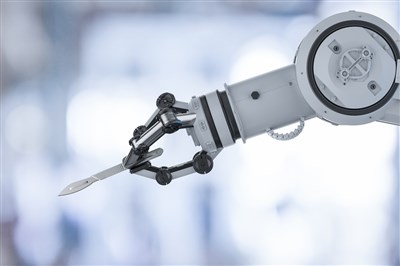
If you've ever seen footage of that Da Vinci robotic surgery machine managing to peel a grape with a scalpel, then sew the skin back on, then you understand the impact Intuitive Surgical (NASDAQ:ISRG) has in the market. It recently brought out a solid earnings report, and though the stock slipped a bit in after-hours trading, it's still one to consider bringing into the fold, or at least keeping around.
A Slightly Troubled Earnings Report
The news, on the whole, was good for Intuitive Surgical. The company brought in quarterly revenue of $3.58 per share, which easily beats consensus estimates of $3.12. The earnings reports proved likewise sound, delivering $1.33 billion against expectations of $1.25 billion, an $80 million beat. Earnings were also up, reports noted, 4% against the same time the previous year. Just to round out the good news, the company shipped 326 Da Vinci units, which was up around 3% over the same time last year.
The company reported an increase in procedure volume, as hospitals were allowed by various governments to do things that weren't coronavirus-related. In fact, the company reported that procedures were up 6% over the same time last year, and up 1% against the full-year 2019 figures. But that still meant fewer units were going out the door and into hospitals. Further reports also noted adjusted earnings per share for 2020 coming in at $10.16, which is actually down 20.4% against 2019's figures. Thus, despite gains in revenue, earnings and sales overall, the company still saw its share price slip a bit going into today's trading.
Caution From the Analyst Quarter
While Intuitive Surgical does seem to have had a decent year amid some of the most disastrous economic conditions imaginable, the broader pool of analysts is less certain of its overall fate. Based on our latest research, the company is currently set at “hold”, and has been so for the last six months.
Perhaps worse for the company, the ratios going into that score have been in decline for that same time period. Six months ago, the company had three “sell” ratings, six “hold” and 13 “buy.” Three months ago, that fell to three “sell”, seven “hold” and 12 “buy.” A month ago, “hold” and “buy” traded analysts again to achieve three “sell”, eight “hold” and 11 “buy.” Now, the company stands at three “sell”, eight “hold” and 10 “buy.” Bearish sentiment is on the rise as “buy” recommendations flee the field.
The price target has mostly increased in that time frame, though; six months ago it was at $658.82, and rose to $718.28 three months ago. It fell to $718 a month ago before climbing to $732.82, which actually represents a downside figure for the first time as the stock trades at $771.98 as of this writing. Earlier today, however, four analysts boosted their price targets on the company, though to wildly different degrees.
A Competitive Advantage, But Is It Enough?
There are two great appeals of a tool like the Da Vinci robotic surgery system. One, the system is clearly designed to be minimally invasive. When you can see a system capable of not only surgically peeling a grape but then suturing the skin back on said grape, you know that any wounds caused by a Da Vinci system will be pretty much as small as can be by current medical technology. That's attractive to most anyone looking to have surgery done, as small wounds tend to mean less pain and faster recovery times. That's less time in hospital recovering, and people getting home sooner, which is a positive no matter who you are.
The second, and probably less considered, is especially important in the pandemic era. With a Da Vinci, the system is largely automated and can be controlled remotely. That means no one needs to be in the room with the patient. Sure, the patient needs to be properly put in place, and there should be someone around in case an emergency arises, but that surgery can be carried out by someone well outside of social distancing range. Even if further lockdowns emerge, which looks increasingly unlikely, surgeries can still take place.
Having a Da Vinci system, therefore, makes some hospitals more attractive than others, which means more business, more revenue, and if managed correctly, more profit. The problem, of course, is that Da Vinci systems are expensive. The current price tag is around $2 million per unit, and that means a lot of surgeries need to take place just to cover the costs. Emphasizing long-term value at healthcare providers here could be helpful in getting more out the door. For investors, meanwhile, it's worth hanging on to any current shares, because all that's really needed is a bit of a price drop to make the Da Vinci the must-have surgical tool of the future.
Companies in This Article: